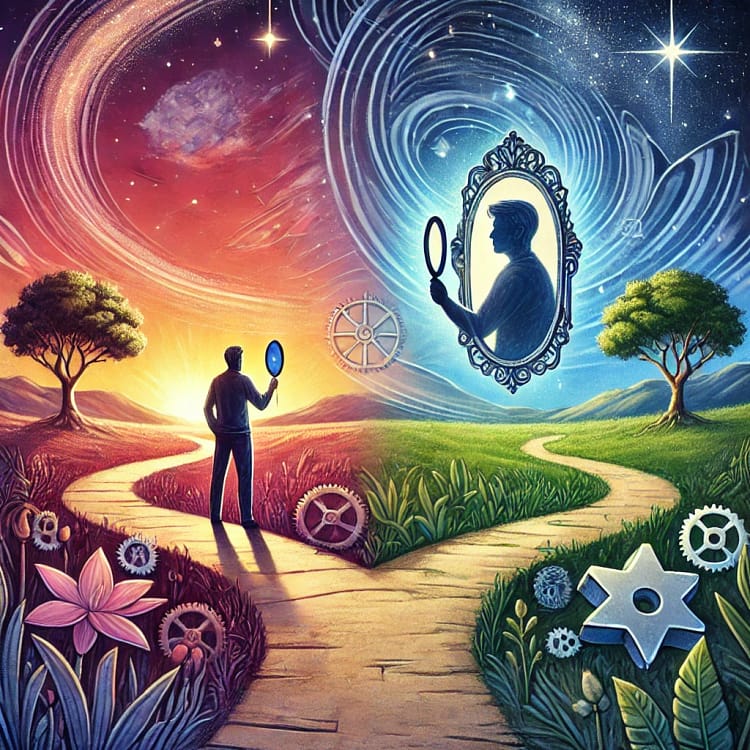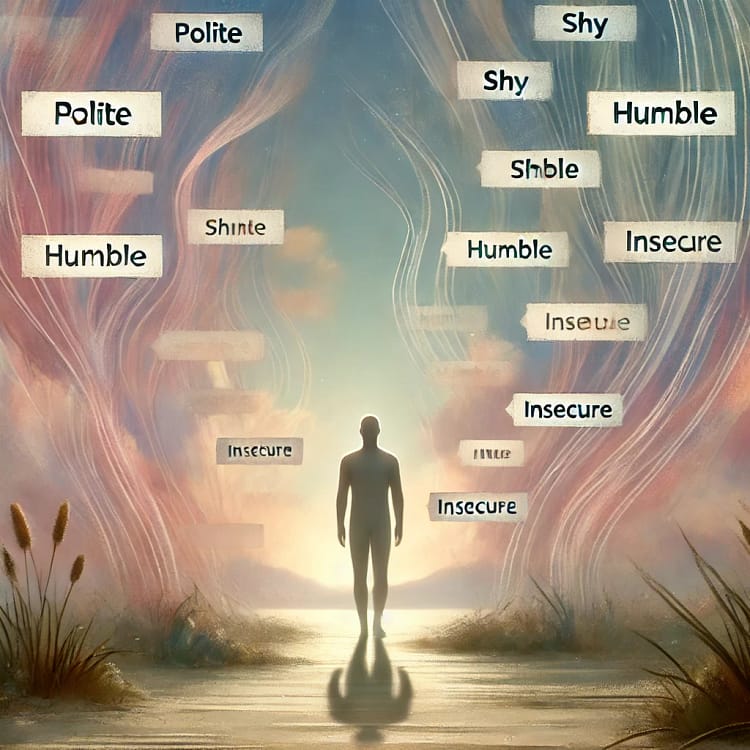
“Know Thyself.” This ancient phrase, etched into the Temple of Apollo at Delphi, has inspired seekers for centuries. But what does it mean to truly “know” yourself? Often, we think of self-knowledge as knowing our favorite things—foods, colors, movies, or even decisions that we think define us. But self-knowledge goes far deeper. It requires not only understanding the motives behind our actions, the fears and beliefs influencing our choices, and the parts of ourselves shaped by social conditioning, but also developing the ability to detach and see these as aspects we carry or behaviors we exhibit and not as the defining elements of who we truly are. To know oneself is to uncover who we truly are beneath the surface and embrace the complex tapestry of our inner world.
The Depth of Self-Knowledge: Going Beyond Labels
We all carry labels, assigned by others or adopted over time. Some of these labels may reflect strengths: “You’re so polite,” “You’re patient,” “You’re humble.” Others may point to struggles: “You’re shy,” “You’re insecure,” “You’re intense.” With time, these labels have become part of our false identities, not really representing who we are but rather what we think we are or what society perceives us as. For instance, a person might have adopted the label of “shy” after years of struggling to be heard in a boisterous family, or they may have accepted “patient” as an identity in situations where their needs were overlooked. To “know thyself” in a deeper sense is to begin examining these labels, their origins, and what beliefs they are attached to. Were they cultivated out of necessity? Are they parts of your authentic self, or are they roles you played to feel safe and accepted? For many, these patterns are strategies developed in childhood, helping them navigate emotional or social challenges. Yet, over time, they can calcify, leaving us feeling defined by a rigid set of traits that may not reflect who we truly are.

The Depth of Self-Knowledge: Going Beyond Yourself

After a long journey in my late 30s, I began to see that not only were the labels I’d assigned to myself untrue, but many of the opinions I’d strongly held about myself and life weren’t even mine. They didn’t reflect my happiness or well-being; instead, they stemmed from family and close circles. Ideas about what it means to be a man, to succeed, to be happy, to be a good person—even my sense of right and wrong—were all shaped by the environment I grew up in, not by my own true beliefs. I was following paths and models that didn’t bring me joy or peace. It might sound strange, but many of us carry strong opinions and beliefs to which we’re deeply attached, yet they don’t reflect who we genuinely are. They’re just ideas we’ve unconsciously adopted over time, rather than what we authentically think or feel.
Self-Knowledge Through Exploration: Identifying Internal Roadblocks

A major part of knowing oneself is understanding how hidden fears, past experiences, and unexamined beliefs shape our lives. Self-inquiry allows us to ask questions that reveal the stories we hold about ourselves: Do you believe that you aren’t good enough? Do you believe success will distance you from people you love? Do you fear rejection if you step out of your comfort zone? These internal narratives can create powerful roadblocks.
For example, someone with a deep-seated fear of rejection may avoid taking risks or trying new things, not because they lack interest or talent but because they believe that being rejected would affirm their unworthiness. Similarly, people who internalize the belief that they must constantly achieve to be valued may pursue accomplishments tirelessly but never feel a sense of fulfillment or rest. When we understand these inner roadblocks, we can begin to rewrite our stories in ways that are freeing, authentic, and aligned with our deepest values.
Tools for Self-Discovery: Combining Traditional and Spiritual Approaches

Self-discovery doesn’t happen overnight, and thankfully, there are many tools to guide the process. In addition to personal reflection, you may benefit from frameworks that can help you better understand aspects of yourself and your personality. These tools range from psychological assessments to spiritual and esoteric practices.
- Myers-Briggs Type Indicator (MBTI): This personality assessment categorizes individuals into one of sixteen types, providing insights into preferences for social interaction, information processing, and decision-making. Knowing whether you’re an introvert or extrovert, a thinker or feeler, can help you understand how you navigate the world and interact with others.
- Enneagram: This personality system identifies nine core motivations, each associated with different strengths, weaknesses, and growth paths. Understanding your core motivation can provide insight into the fears that drive you and the patterns that recur in your life.
- Astrology and Numerology: Spiritual tools like astrology and numerology go beyond psychology and explore your life purpose, potential challenges, and energies aligned with your birth chart or numbers. While not everyone connects with these tools, they can offer a unique perspective on your personal path.
- Journaling and Reflection: Keeping a journal is a powerful practice for self-reflection. Writing down your thoughts, experiences, and questions allows you to capture insights that may otherwise go unnoticed and helps reveal patterns over time.
While these tools offer a starting point for understanding yourself, they’re not replacements for personal work and reflection. True self-knowledge comes from integrating the insights you gain into daily life and making conscious changes that reflect your understanding.
Unraveling Beliefs: The Path to Self-Knowledge
A crucial aspect of self-knowledge is developing self-awareness and the ability to become a compassionate observer. Over time, we will learn to gain a higher viewpoint on ourselves and our worldview. We will be able to see through the lenses and definitions that shape our perception of the world. We will identify our beliefs and the responses that arise from them. As observers, we will recognize that we have a choice: to continue following beliefs and behaviors that do not serve us or to let them go. We will have the ability to question these beliefs, the stories they convince us to accept, and the value they provide. We will be able to make peace with letting go of what we thought defined us in the past, without allowing fear to get the best of us.
Embracing Growth as a Lifelong Process

One of the most freeing realizations about self-knowledge is that it’s a never-ending journey. Every life experience—whether success, failure, joy, or sorrow—offers a lesson that deepens your understanding of who you are. New insights unfold as you age, allowing you to peel back additional layers of your inner world. The process of getting to know oneself can be challenging, as it often involves confronting uncomfortable truths and breaking away from familiar but restrictive roles. But with each layer you uncover, you step closer to a more authentic, fulfilling life.
Many people find that as they continue on their path of self-knowledge, they become more resilient, grounded, and confident. They start to recognize patterns that no longer serve them, making choices that reflect their true values rather than the expectations of others. By cultivating an open, compassionate curiosity about yourself, you create space for growth, transformation, and joy.
Why Self-Knowledge Leads to a Richer Life

As you become more aware of your desires, values, and authentic self, you’ll naturally begin to make decisions that align with your true identity. This leads to a life filled with more meaning, deeper connections, and greater fulfillment. Knowing yourself empowers you to set boundaries, say no when needed, and take action that honors your well-being. Instead of being influenced solely by external expectations, you’ll be guided by an inner compass, moving toward a life that resonates with your purpose.
Start Today: Taking the First Steps Toward Knowing Yourself
The journey to self-knowledge begins with a single step. Here are some practical ways to get started:
- Reflect Daily: Dedicate a few minutes each day to reflect on your thoughts, feelings, and behaviors. Ask yourself: What made me feel energized today? What drained me? Over time, you’ll start noticing patterns that reveal your authentic preferences.
- Challenge Your Assumptions: Begin questioning the labels and beliefs you carry. Are they truly representative of who you are, or are they roles you’ve adopted? Challenge yourself to let go of beliefs that limit you.
- Use Self-Discovery Tools: Explore personality assessments or spiritual tools that resonate with you. They can help you gain a broader perspective on your traits, strengths, and areas for growth.
- Embrace Change and Growth: Be open to the idea that self-knowledge is a dynamic process. As you grow, your understanding of yourself will evolve. Welcome these changes as signs of personal growth and transformation.
Are you ready to begin this journey of self-discovery? Start today, and take a step closer to a richer, more authentic life. By embarking on the path of knowing yourself, you unlock the potential to create a life that is genuinely fulfilling, one aligned with your deepest values and truest desires.